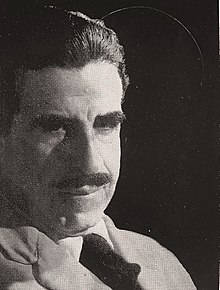Luis Franco (Argentine Writer)
| Luis Franco | |
|---|---|

Portrait, 1959. By Alejandro Castro.
|
|
| Born |
November 15, 1898 Belén, Catamarca, Argentina |
| Died | June 1, 1988 (aged 89) Buenos Aires, Argentina |
| Occupation | Poet, essayist |
Luis (Leopoldo) Franco (November 15, 1898 – June 1, 1988) was an autodidact, a self-made intellectual, essayist, and poet. He was the son of Luis Antonio and Balbina Acosta and lived most of his life in his native province far from the limelights of Buenos Aires and the academic world which he sincerely despised in favor of a bucolic and rural setting of his father's cattle farm in Belén. At age seventeen Franco was awarded a literary prize for his Oda primaveral. Franco traveled a considerable distance to receive the award riding on a mule's back from Catamarca Province to Tucuman. The attitude raised a few eyebrows in Buenos Aires and a relevant article was publish in the prestigious magazine Caras y caretas relating the story of this promising young author. The first literary personality to open the doors to Franco was Horacio Quiroga. Quiroga would eventually introduced Franco to Leopoldo Lugones who recognized his talent and potential. Soon Franco became a recognizable name in the literary world of his time making the acquaintance of Roberto Arlt, Gabriela Mistral and Juana de Ibarbourou amongst others. However, Luis Franco found it difficult to coexist with the cultural apparatus and the bourgeois-style of other intellectuals in Buenos Aires, and soon -after completing his High School degree- returned to his hometown of Belén. In Belén, Franco resided most of his adult life doing what he loved most: working the land, reading and writing. As a result of a personal crisis –coincidental with the military coup of general José Evaristo Uriburu in 1930- Franco dissociates himself from right wing revisionists such as Lugones and begins an audacious journey of introspection in the nature of Argentina’s political past. The result is a copious bibliography of essays where the ghost of saints and devils of Argentina’s turbulent 1800’s comes to life in a unique fashion, one that perhaps Franco only shares with Ezequiel Martínez Estrada.
...
Wikipedia
